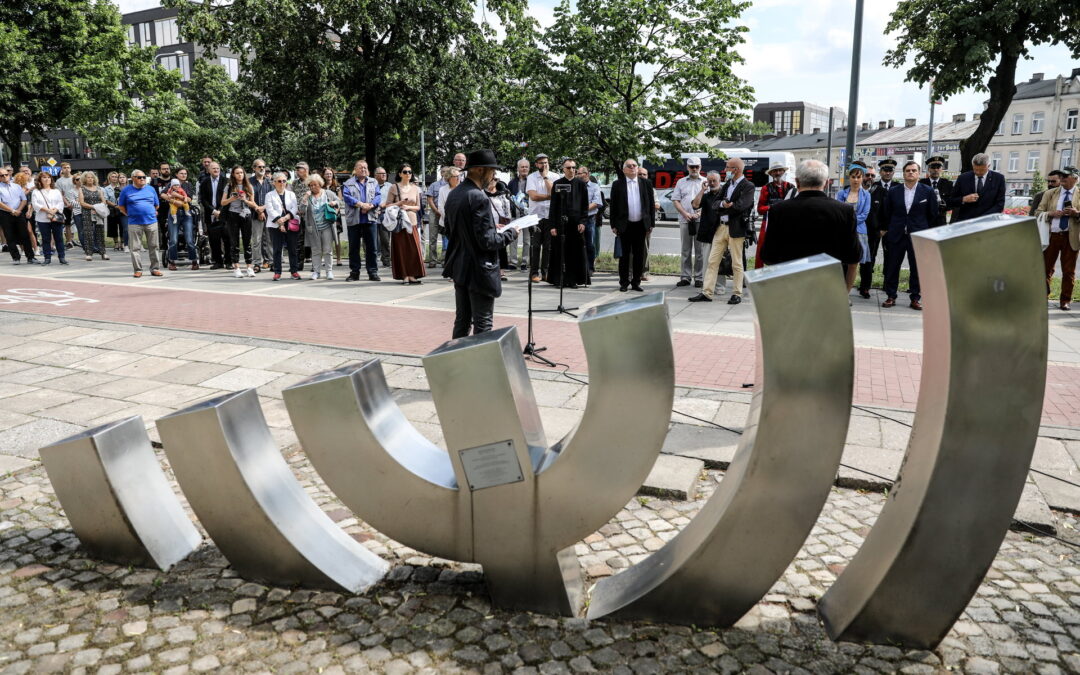National and local authorities, Jews and Christians came together on Sunday to commemorate the 75th anniversary of the Kielce pogrom, in which 42 Jews were killed and more than 40 wounded. It was the deadliest outbreak of violence against Jews in Poland after the Holocaust, and is often described as “Europe’s last pogrom”.
The incident, which involved soldiers and police as well as civilians, was triggered by a rumour that a Christian child had been kidnapped by Jews. It took place amid a series of anti-Jewish riots in the aftermath of World War Two which led many of the Polish Jews who had survived the Holocaust to flee the country.
Even today, controversy remains around the tragic events, with some arguing that the pogrom was incited by the communist authorities in order to discredit Poles.
The Kielce pogrom, on July 4th, 1946, shocked the Jewish community of Poland. 42 Jews were murdered in the streets; soon after, 75,000 fled the country. It changed the minds of Polish Jews for good about rebuilding Jewish life in Poland after the #Holocaust. pic.twitter.com/YDR142pFsf
— World Jewish Congress (@WorldJewishCong) July 4, 2021
“We have many reasons for crying, grief and sadness, at least three million of them,” said Bogdan Białek – the head of the Jan Karski Society, which promotes tolerance, dialogue and reconciliation – referring to the number of Polish Jews killed in the Holocaust during the German Nazi occupation.
“We also have reasons to feel shame and repentance – a few dozen or maybe a few hundred thousand,” he added, referring to cases in which Poles were responsible for the deaths of Jews.
“But today we came together because of 46 reasons for grief, crying, shame and reverie,” said Białek, whose society organised Sunday’s commemorations, which were attended by representatives of President Andrzej Duda and Prime Minister Mateusz Morawiecki.
Michael Schudrich, the chief rabbi of Poland, stressed that the pogrom was a tragedy for all Polish citizens. “Remembrance is a duty for us all,” he told PAP. “Maybe if we remember we might jointly take a step forward in order not to allow such tragic events to take place again.”
The commemorative events started at the graves of the victims of the pogrom at a Jewish cemetery in Kielce, where before the war Jews had made up almost a third of the population.
Later, a march of remembrance was made to the site of a former synagogue and to a memorial devoted to the Polish Righteous Among the Nations, who have been recognised for helping to save Jews from the Holocaust.
“There is no excuse for the people who killed others,” said deputy culture minister Jarosław Sellin. “They did this because they were of different ethnicity, because of various antisemitic stereotypes.”
The mayor of Kielce, Bogdan Wenta, stressed that the attack occurred against Holocaust survivors who had returned to Kielce. “When the tragedy was over and some went home, hurt and exhausted, they did not find peace, but encountered death,” he said.
The exact course of events, and how they started, still remains unclear. According to the most probable version, on 1 July 1946 a Christian boy, Henryk Błaszczyk, disappeared from home and, when he returned two days later, claimed that he had been kidnapped and kept in a basement by Jews.
On 4 July, a militia unit was sent to investigate a building that served as home to over a hundred Jewish survivors and was the centre for the local Jewish community.
Despite it being found that there was, in fact, no basement in the building, rumours about the kidnapping and blood libel – the false claim that Jews use the blood of Christian children for ritual purposes – spread through the city and an angry mob surrounded the site.
The outbreak of violence led to dozens of Jews being killed – though sources differ on the exact number – and many more being wounded.
Many on the political right have sought to play down Polish responsibility for the crime, suggesting that it was the responsibility of the communist authorities.
“We have to remember that it was 1946, and Soviet soldiers and the UB [communist security services] were still here,” Waldemar Bartosz, head of the provincial branch of Solidarity trade union, told state broadcaster TVP. “They allowed this murder, they fenced off the whole area and didn’t let anyone in.”
Controversy today on the 73rd anniversary of the Kielce pogrom. The head of the city's Jan Karski Society criticised the Solidarity trade union for placing a wreath paying tribute to 42 Jews who died as 'victims of UB [communist secret police] provocation' https://t.co/tt5FPpskVX
— Notes from Poland 🇵🇱 (@notesfrompoland) July 4, 2019
“This history drags on with consecutive generations, and still stirs huge controversies and emotions, which will still last for a long time,” said Dorota Koczwańska-Kalita, head of the IPN in Kielce. She called for further research “free from ideological disputes”.
“If we ae going to put on left-liberal or right-conservative corsets, we will become ahistorical and we will create disputes that are not academic, and we will never reach our goal, which should be remembrance based on understanding,” she warned.
In 2006, the then president, Lech Kaczyński, declared “clearly and emphatically [that] what happened in Kielce 60 years ago was a crime” and both “a great shame and a tragedy for Poles” for which “there can be no justification”.
Main image credit: Wojciech Habdas / Agencja Gazeta

Agnieszka Wądołowska is deputy editor-in-chief of Notes from Poland. She is a member of the European Press Prize’s preparatory committee. She was 2022 Fellow at the Entrepreneurial Journalism Creators Program at City University of New York. In 2024, she graduated from the Advanced Leadership Programme for Top Talents at the Center for Leadership. She has previously contributed to Gazeta Wyborcza, Wysokie Obcasy and Duży Format.




















